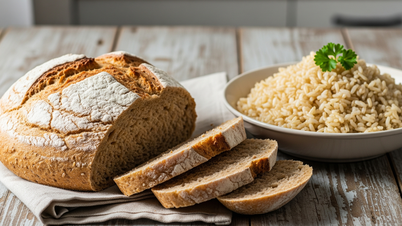Starting the day with health news , readers can also read more articles: How many bananas should you really eat each day?; Foods to avoid for a healthier gut ; Vitamins that help reduce blood pressure, blood fat, blood sugar after age 50...
Discover the surprising effects of egg yolks on the elderly
As osteoporosis becomes an increasingly common health concern worldwide , especially in older adults, researchers are looking for alternative treatments to combat bone loss.
A new study recently published in the scientific journal Food Science of Animal Products, has discovered the amazing ability of egg yolks in controlling osteoporosis.
Researchers at the University of Alberta (Canada) studied the effects of egg yolk hydrolysates on bone formation.
Discovering the benefits of egg yolks for osteoporosis - Photo: AI
Egg yolk hydrolysis is the process of dissolving egg yolk in water, adding enzymes, then going through 3 complex segments called FA, FB and FC, obtaining a powdered product and storing it at -20°C, according to the medical news site News Medical.
In the next step of the study, the authors tested the inhibitory effects of products from these three egg yolk fractions on the control of osteoporosis.
The results were surprising: The final fraction FC exhibited the strongest effect, able to reduce osteoclast formation by more than 50%, highlighting the anti-osteoporosis potential of egg yolk.
Egg yolks help control osteoporosis in the elderly?
The authors say: This study opens up exciting prospects for bone health. By isolating the water-soluble egg yolk fraction to fraction 3, we have discovered a natural compound that not only inhibits osteoclast formation but also promotes osteoclast apoptosis. This dual effect offers a promising alternative to current treatments for osteoporosis. The next content of this article will be on the health page on August 9 .
Foods to Avoid for a Healthier Gut
According to experts, eliminating certain harmful foods from your diet can help protect your gut and reduce your risk of cancer.
According to many studies, in addition to genetic factors and age, daily diet plays an important role in increasing or decreasing the risk of disease. For people with risk factors such as family history, inflammatory bowel disease or an unhealthy lifestyle, food choices become even more important.
According to Ms. Reshma Nakte, a nutritionist working in India, eliminating certain harmful foods from the diet can help protect the intestines and reduce the risk of cancer.
Regular consumption of beef, pork, lamb... increases the risk of colorectal cancer - Photo: AI
Processed meats. Meats such as bacon, ham, sausages, and hot dogs often contain nitrates and nitrites. When these substances enter the body, they can combine with amino acids in the intestines and create compounds that can cause cancer.
Instead, choose naturally lean proteins like chicken, fish, tofu, and beans.
Red meat. Regular consumption of large amounts of beef, pork, and lamb increases the risk of colorectal cancer.
Cooking methods also matter. Grilling, pan-frying, or frying can create toxic compounds that can cause cancer. To reduce your risk, eat red meat in small portions and keep it simple. The next part of this article will be on the health page on August 9.
Reduce blood pressure, blood fat, blood sugar after age 50: The secret is in this vitamin!
A large-scale review and meta-analysis recently published in the scientific journal Engineering has found protective power against common cardiovascular risk factors from a familiar vitamin.
Scientists at the Center for Global Cardiometabolic Health, Brown University and Columbia University (USA), in collaboration with many research institutes and universities in China, comprehensively analyzed and evaluated 99 studies, including 17,656 participants.
Results found that vitamin D supplementation, at an average dose of 3,320 international units (IU) per day, had positive effects on cardiometabolic risk factors, including:
- Reduces systolic and diastolic blood pressure.
- Reduce total cholesterol levels.
- Reduces fasting blood sugar levels.
- Reduced average blood sugar HbA1c.
- Reduces fasting insulin levels.
Vitamin D supplementation has had positive effects on cardiometabolic risk factors - Illustration: AI
Notably, the researchers found that the benefits of vitamin D supplementation were most pronounced in people with very low vitamin D levels (below 15 ng/ml), people who were not obese (with a body mass index BMI below 30 kg/m2 ) , and especially people aged 50 and over.
Researchers noted that high-dose vitamin D supplementation (3,320 IU) for 3 months or more may help optimize cardiometabolic health outcomes. This raises the need for personalized approaches to treatment and prevention. Start your day with health news to see more of this article!
Source: https://thanhnien.vn/ngay-moi-voi-tin-tuc-suc-khoe-long-do-trung-than-duoc-cho-nguoi-lon-tuoi-185250808222948073.htm












































































































Comment (0)